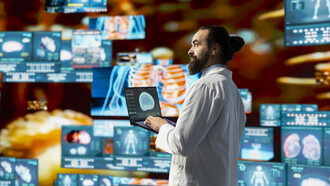Dear Greta,
After I’d begun learning about telecommunications’ public health and environmental impacts; after more children than I can count became screen addicts; after studies showed that using a mobile phone increases risk of cancer (but didn’t get media attention) and far too many people got brain or tongue or thyroid cancer; after countless legislative sessions prohibited policymakers from considering the health or environmental effects of exposure to electromagnetic radiation when they voted to permit or deny new transmitting cellular antennas; after learning that 5G mobile networks’ deployment will increase telecommunications’ energy use and greenhouse gas emissions exponentially and increase the public’s and wildlife’s exposure to electromagnetic radiation, I admitted to myself that I am powerless over telecom corporations and that my life has become unmanageable.
I called a geophysics professor and growled: “I need a god bigger than AT&T.” He told me to try Verizon1.
Electricity, a computer and Internet access give us extraordinary opportunities. But using any of these also means that we participate in ecological damage and depend on corporations over which we have no control. I do not expect electricity or electronic devices or telecom corporations to go away or get safer or less toxic or less hazardous or more respectful of democracy.
Still, as much as possible, I’d like to reduce my ecological footprint and my dependence on electricity and corporations.
To counterbalance our digital impacts, could we strengthen our relationship to the Earth? Could we re-learn traditional, non-electric skills and develop our humanness—as we have children, grow and prepare food, educate ourselves, heal wounds and illnesses, use transportation and attend to end-of-life issues?
Here are a few steps toward counterbalancing our technology use.
Learn nature’s laws
Natural family planning explains that all life evolves from heating and cooling and drying and moistening. By charting her waking temperature and cervical fluid, a woman can know when she’s fertile and infertile. Pharmaceutical family planning has consequences for women’s health and our ecosystem. In my childbearing years, charting moved me from thinking that I could and should control nature, including my body, without consequences. It helped me revere nature, including my health.
Still thinking about reproduction, I’ve recently learned that If every woman has only one child, then, in four generations, we’d reduce the human population to two billion—and reduce humanity’s strain on the Earth’s carrying capacity. How/could we encourage this without coercion of any kind?
Make home and neighbors
Grow cooking herbs like parsley or thyme at your window. Harvest dandelion greens and other wild edibles from around your neighborhood. Walk to your grocery store. (I consider living within walking distance of a grocery store a great privilege. I’ve become addicted to it!) Cook your own food. Anything processed—even vegan burgers2 —engages international supply chains and therefore has a significant footprint.
Build a solar oven. Learn the best time and direction for accessing the sun’s heat. Then, put asparagus, cauliflower or okra—without water—in the oven’s black pot at noon for 30 minutes. Go directly to heaven with the vegetable’s true taste. Install laundry lines. Neighbors can catch up on their lives when they hang linens. Build a free lending library.
Teach counterbalances to technology
I vote that kindergarteners through to university students learn how to build nutrient-dense soil, grow vegetables and keep compost.
Delay children’s use of electronics until reading, writing and math are mastered on paper. With Covid, I considered this is impossible. Then I learned that to protect students’ eyesight and prevent them from Internet and gaming addiction, China just banned mobile phones in schools3. In 2018, after more than 40% of Shandong, China’s children developed myopia, educators allowed no more than 15 minutes per screen time session, and no more than one hour per day4.
At fix-it clinics, retirees can teach youth how to repair and repurpose clothes, electronics, appliances and cars. At community centers, we could all learn self-help care to restore and maintain health through food, herbal remedies and movement. Grandparents, parents and students could share questions and experience. We could encourage each other to pace ourselves and rest, regularly. (If I kept one day each week free of electronics, would I feel better?)
Include the end-of-life in our awareness: besides making compost, get a biodigester. Use kitchen scraps to make methane (to power appliances) and fertilizer5. Quit acquiring junk. Give away unused stuff.
Annually, review your health care directive, pre-need obituary and burial plan. Cremation takes lots of energy and emits greenhouse gases and toxins. How/could we make arranging a burial with minimal impacts easier and affordable?
Question every product’s cradle-to-cradle impacts
Besides strengthening our relationship to the Earth from our cradles-to-graves, continue developing awareness of technology’s impacts. Wait at least four years before upgrading to a new computer or device, then let the questions roll: Is this product or service within our ecological means? When people are food or housing-insecure, how/can we counterbalance purchasing new telecom products and services? What’ll become of this device when I no longer use it? What are the ecological impacts of manufacturing, operating, discarding this product—and its infrastructure?
Track the international supply chain of one substance in a device you already own—or want to own.
Challenge ourselves
Name five daily activities that depend on electronics—then figure out how to do these activities with minimal or no electronics. I’m not suggesting use of “renewable” power here. If you include the manufacturing of a solar photovoltaic system (for example), then charging your phone with it will still use significant power and extraction and emit significant greenhouse gases and toxins. I’m suggesting activities like reading library books—aware that that could mean driving to the library, and that the book engage the global super-factory supplying paper and ink for its production.
Nothing about this situation is simple. Recently, at the grocery store, I discovered I’d left my credit card at home. Using a credit card is energy-intensive. But paying cash meant that the cashier tossed and replaced a pair of rubber gloves to limit Covid’s spread.
Meanwhile, a friend whose work requires a smartphone and who knows about the deadly impacts of mining for coltan and graphite and lithium (in smartphone batteries), wonders if counterbalancing extraction in smartphones is possible. A friend with a hybrid car and a solar PV system wonders how she could counterbalance their cradle-to-cradle impacts. Once we know about computers’ and vehicles’ ecological impacts, how do we counterbalance them? Morally and ethically, as responsible members of society, what can we do?
To get meaningful answers to these questions, we will need to talk with each other.
Ask. Talk. Share
Cultural change happens in groups of seven. If we connect more with the Earth and share our questions and experience with other people, could we reduce our dependence on electricity and corporations? Would we smile more, even under masks?
Let’s take what we learn to legislators. Internationally, governments are dedicating trillions of dollars to increase telecom infrastructure, children’s learning-on-a-tablet, electric vehicles’ production and charging stations, and building new power plants. Could five percent of these funds go to developing traditional skills? Could every household, school, workplace get raised planting beds with nutrient-dense compost and seeds?
Yours,
Katie
Notes
1 AT&T and Verizon are large U.S. telecom providers.
2 Steinbauer, James, “Battle of the Burgers,” Sierra, March, 2020.
3 Osborne, Sam, China bans mobile phones in schools “to protect students’ eyesight” and prevent addiction, The Independent, Feb. 3, 2021.
4 China Daily/Asia News Network, “China bans mobile phones in classrooms,” Oct. 10, 2018.
5 Food Waste Audit, Univ. of Florida.















